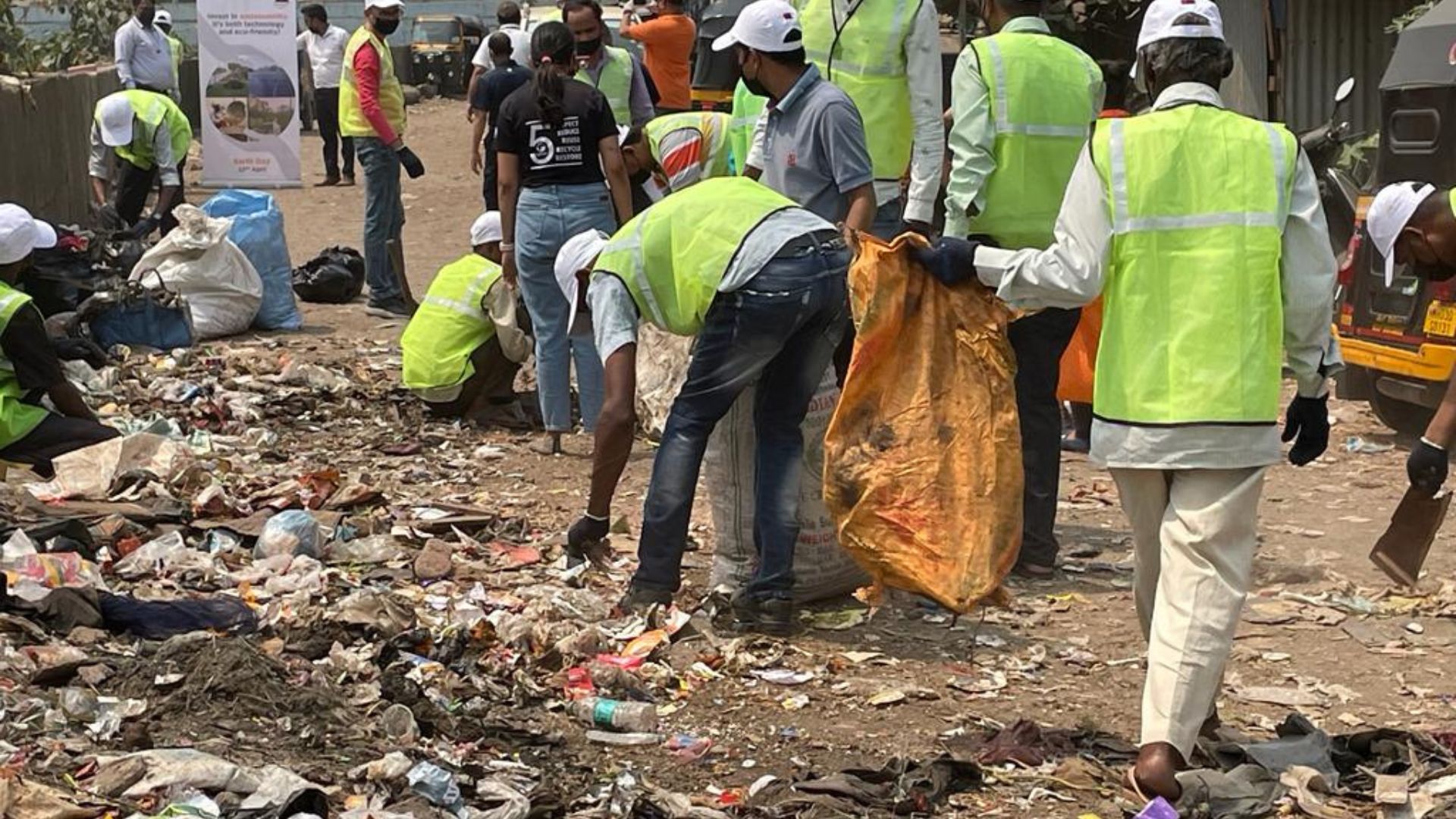Earth5R, an environmental organization based in India, recognizes the urgency of tackling plastic pollution. As plastic waste continues to pose a significant threat to the environment, Corporate Social Responsibility (CSR) activities have become imperative in addressing this pressing issue. Through its CSR initiatives and Plastic Free Initiatives, Earth5R is actively involved in combating plastic pollution and promoting sustainable practices within communities.
CSR activities play a crucial role in addressing environmental challenges like plastic pollution. Earth5R’s initiatives aim to raise awareness about plastic waste management and promote sustainable practices within communities.
India’s Plastic Waste Problem
India’s streets, water bodies, and public spaces often suffer from plastic litter because many areas lack good systems for collecting and separating waste. This means that plastic waste is not sorted properly, leading to pollution.
In Mumbai alone, around 10,000 metric tonnes of waste is generated daily, but only about 3,500 metric tonnes are collected and processed. In Dharavi, one of Asia’s largest slums located in Mumbai, thousands of people work in recycling plastic waste, often without proper protection or facilities.
Only about 60% of plastic waste is recycled in India, and much of it is done through informal methods that may not be efficient or environmentally friendly. India uses a lot of single-use plastics, like plastic bags and food packaging, which adds up to a huge amount of waste & this generates around 26,000 tonnes of plastic waste every day, and a significant portion of it comes from single-use plastics.
Many people in India aren’t aware of how plastic waste harms the environment or the importance of disposing of it properly. This leads to littering and pollution. A survey found that only about 20% of Indians are aware of plastic waste recycling options.
Insights of Plastic Waste from India’s Top Cities
- Delhi:
Delhi generates approximately 690 metric tons of plastic waste per day, making it one of the highest contributors to plastic pollution in India.
The improper disposal of plastic waste leads to clogged drains, pollution of water bodies, and environmental degradation. - Mumbai:
Mumbai generates around 500 metric tons of plastic waste daily, exacerbating the city’s waste management challenges.
Plastic pollution in Mumbai is particularly severe along the coastline, where plastic debris poses threats to marine life and ecosystems. - Bengaluru:
Bengaluru generates approximately 300 metric tons of plastic waste every day, despite the city’s reputation for its IT industry and environmental initiatives.
Plastic waste management remains a significant challenge in Bengaluru, with issues such as littering and inadequate waste collection and disposal infrastructure. - Chennai:
Chennai generates over 429 metric tons of plastic waste daily, contributing to pollution in urban areas and coastal regions.
The city faces challenges in managing plastic waste due to insufficient recycling infrastructure and limited public awareness about proper disposal practices. - Kolkata:
Kolkata generates around 300 metric tons of plastic waste per day, with plastic pollution affecting water bodies and public spaces.
Efforts to address plastic waste in Kolkata include awareness campaigns, waste segregation initiatives, and the promotion of alternatives to single-use plastics.
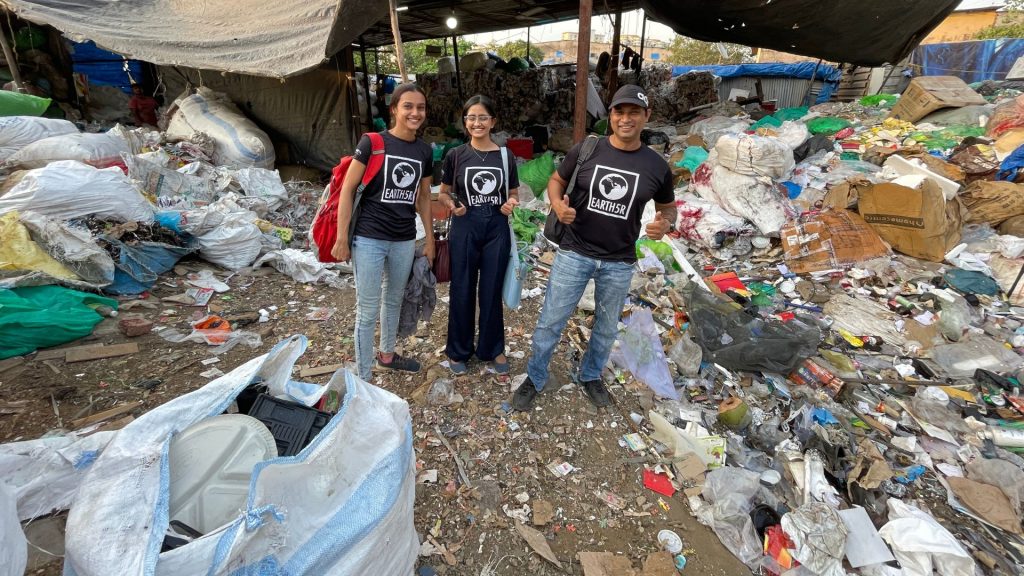
Earth5R’s management of plastic waste through campaigns.
Earth5R’s Approach to Plastic Waste Management
Earth5R employs a multi-faceted approach to plastic waste management, involving event planning, on-ground execution, and collaboration with fieldwork specialists and volunteers. Through initiatives such as plastic collection drives and awareness campaigns, Earth5R strives to reduce plastic usage and promote recycling. Also setting up improved waste collection and segregation systems, including separate bins for different types of waste in local communities.
Circular Economy
In a circular economy, resources are used efficiently, and waste is minimized by keeping products and materials in use for as long as possible. It aims to move away from the traditional linear “take-make-dispose” model towards a closed-loop system where materials are continuously reused, recycled, or regenerated.
It demonstrates a commitment to sustainability by reducing environmental impact and promoting resource efficiency. Companies can contribute to the circular economy by implementing eco-friendly practices, such as product redesign, waste reduction, and recycling initiatives.
The circular economy offers long-term solutions to pressing environmental issues, such as resource depletion, pollution, and climate change. By transitioning towards a circular model, businesses can contribute to building a more resilient and sustainable future for society and the planet.
Plastic Free Initiatives: Earth5R Plastic Credit Program
Like carbon credits, plastic credits are something that a company purchases to offset its plastic footprint. Basically, you purchase plastic credits based on the weight of the plastic that your company produces.
The money spent on the plastic credits will then go toward environmental projects that will eliminate an equal amount of plastic waste as you produce. If a company purchases plastic credits equal to the amount of plastic they produce, they are considered plastic neutral. Put simply, plastic neutrality enables you to balance your plastic consumption.
However, they are a positive short-term remedy while we, as a world community, determine a more sustainable solution. Rivers carry plastic waste from deep inland to the sea, making them significant contributors to ocean pollution. A staggering 8 million tonnes of plastic end up in the world’s oceans every year.
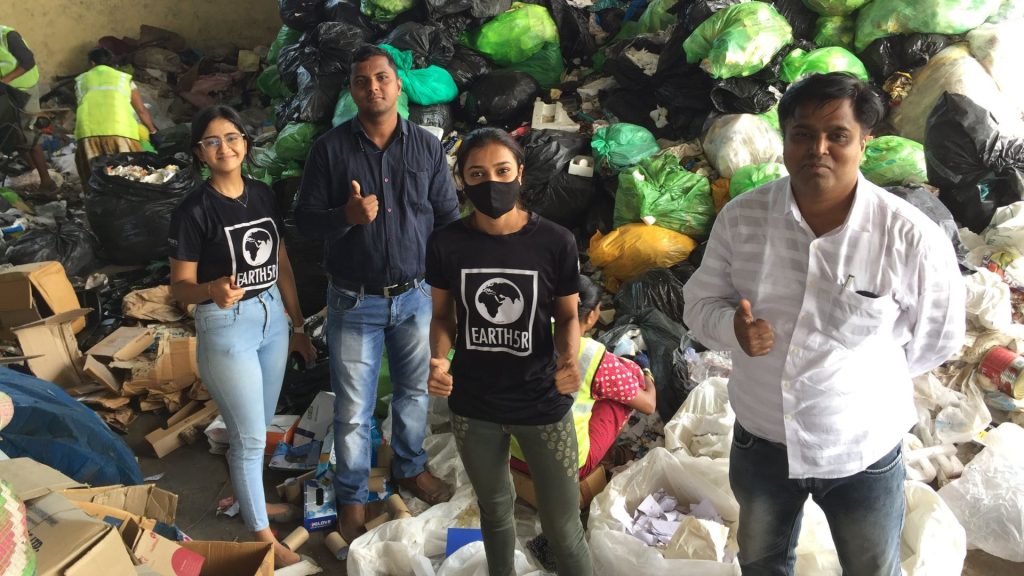
Earth5R initiates community engagement for Plastic waste management.
Innovative Recycling Methods for a Sustainable Circular Economy
Recycling programs encompass different methods to reduce waste and maximize material reuse. Traditional recycling involves processing materials like paper and plastic to create new products. Upcycling repurposes discarded items into higher-value products. Pyrolysis breaks down organic materials into useful byproducts like bio-oil and gas. These approaches promote sustainability by minimizing waste and maximizing resource efficiency in a circular economy.
Tetra packs offer versatile recycling options beyond traditional waste management. Repurposing them into ventures, tiles, and bricks for civil construction reduces waste and promotes sustainability. By transforming Tetra packs into construction materials, we conserve resources and minimize environmental impact while aligning with the principles of a circular economy.
The Eco Bricks program by Earth5R repurposes plastic waste into durable building blocks. Meanwhile, the Sustainable School Program, funded by the Swiss International Airlines Staff Foundation, promotes sustainability education at a local BMC school in Powai, Mumbai. These initiatives highlight the collaboration between organizations and communities to address environmental challenges and foster a greener future.
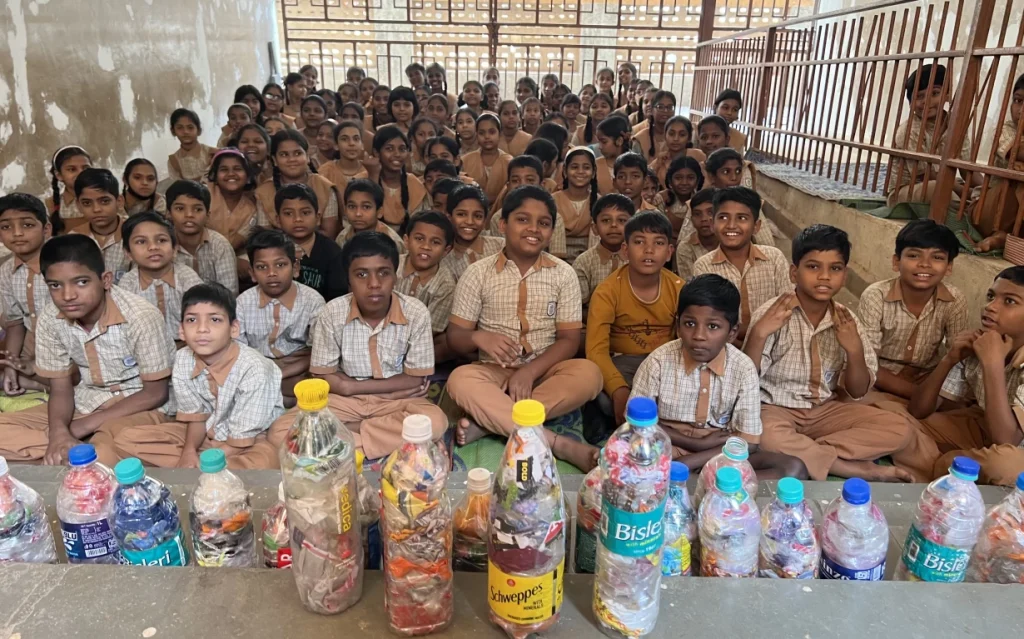
Eco-bricks created by Children of BMC School, Powai Mumbai with Earth5R and Swiss Airlines
Plastic Free Initiatives: UN River Cleanup Project at Mithi River, Mumbai
Earth5R was selected as one of the five recipients to receive funding totaling 0.6 million euros for the ambitious project aimed at cleaning plastic waste from the Mithi River in Mumbai, India. In collaboration with esteemed partners such as the United Nations Technology Innovation Labs (UNTIL), Huhtamäki Oyj, VTT Technical Research Centre of Finland, and River Recycle, Earth5R embarked on this crucial endeavor.
Huhtamaki, a leading global provider of sustainable packaging solutions, had allocated a significant contribution of 3 million euros towards various global sustainability initiatives with a localized impact. By investing in innovation and fostering initiatives that addressed pressing sustainability challenges, Huhtamaki made a tangible difference in communities worldwide.
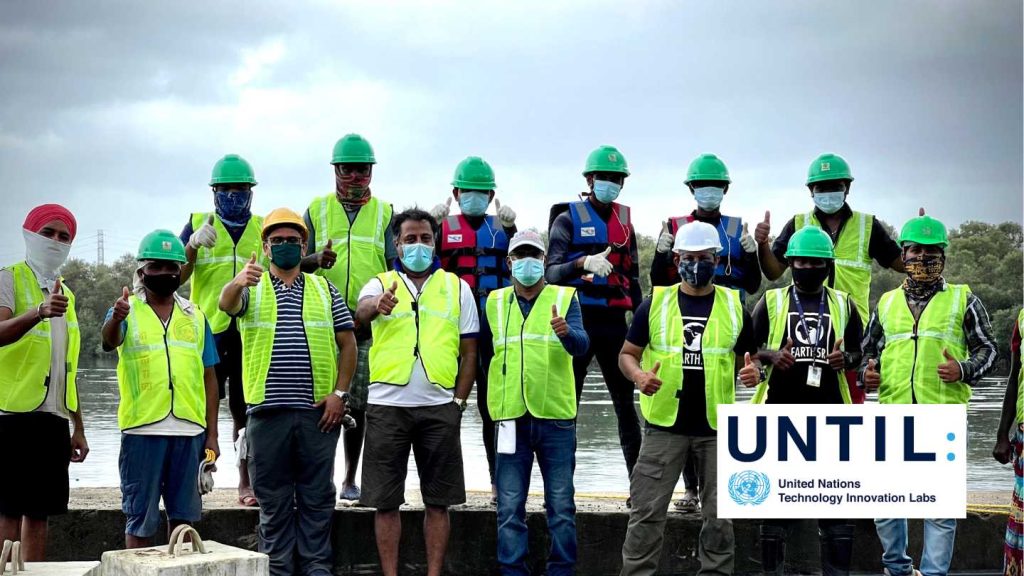
Earth5R Team River Cleanup at Mithi River, Mumabi
Earth5R (E5R) volunteers proudly wear T-shirts made from recycled plastic waste, showcasing a sustainable approach to fashion. The process begins with collecting plastic bottles, which are then cleaned and transformed into fabric yarn. This yarn is then used to produce T-shirts, which are screen printed in local slums, fostering economic opportunities. These recycled plastic T-shirts are not only worn by E5R employees but are also popular among corporates for sports and office events, promoting environmental consciousness in everyday wear.
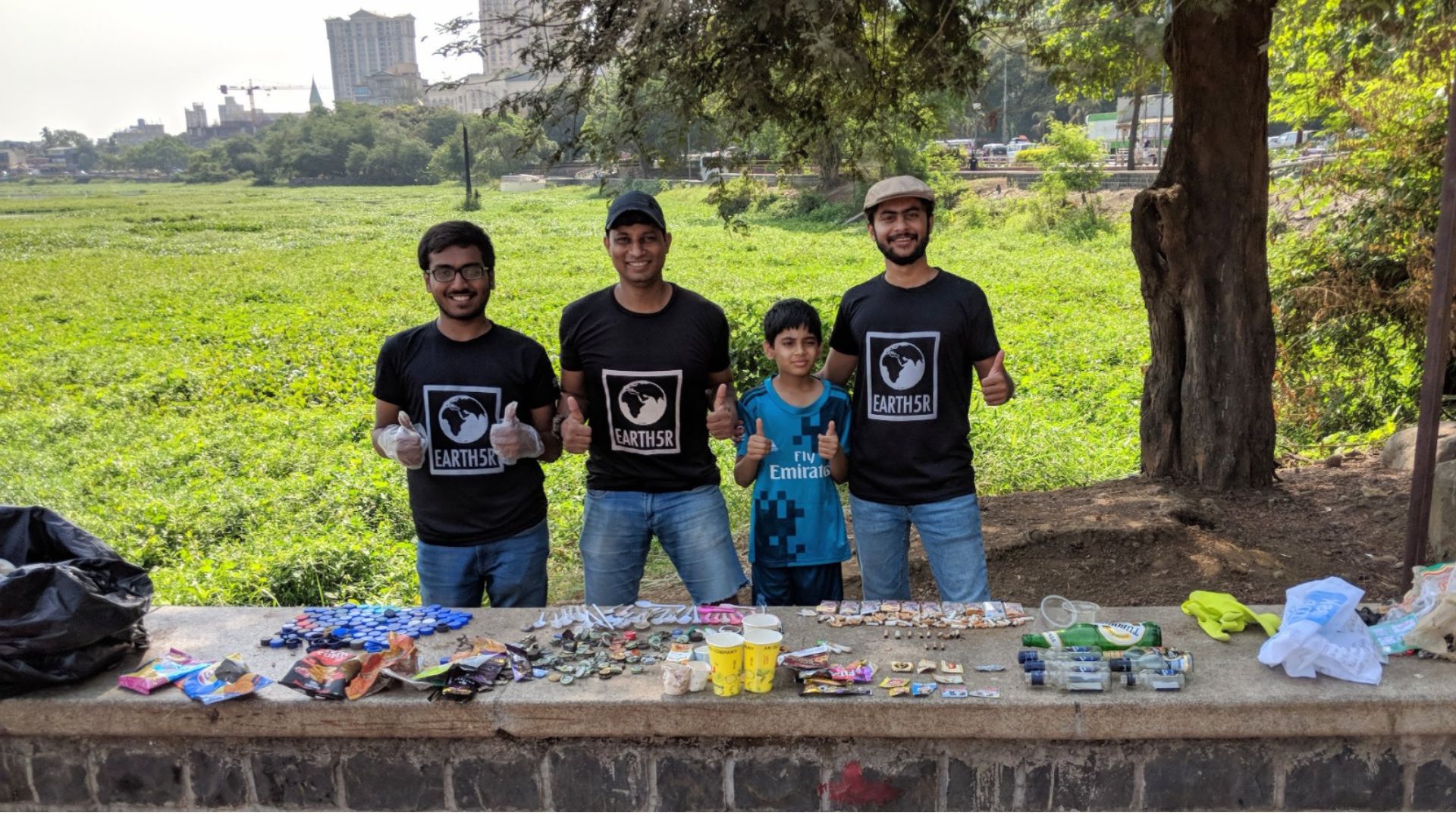
Earth5R’s App
In Earth5R’s volunteerin model, participants engage in Waste Cleanup Survey and Analysis, where they collect and segregate waste while inputting data on the types and quantities of items found into the Earth5R app. This data includes categories such as tetrapack, synthetic fibers, plastic, glass, metal, e-waste, medical waste, organic and more. With the app’s smart algorithm generating comprehensive reports.
These reports provide detailed insights, including breakdowns of waste, facilitating informed decision-making and targeted action towards waste management and environmental conservation efforts.
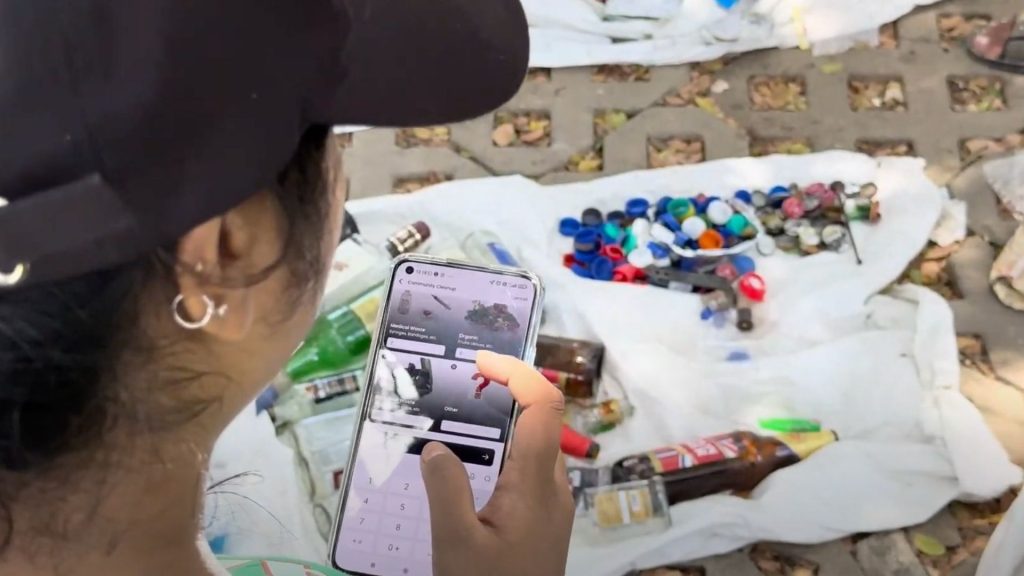
Waste Cleanup Module on Earth5R App
Impact Evaluation and Certification
One of the key aspects of Earth5R’s CSR initiatives is the measurement of impact and the provision of certification. Using innovative technology, including the Earth5R app, the organization calculates carbon offsets and provides carbon certificates, thus enhancing Environmental, Social, and Governance (ESG) ratings. Read More
Earth5R’s plastic waste management initiative in Dehradun serves as a successful case study. Through cleanup sessions and data analysis, volunteers like Arya Mitra have made significant contributions to waste segregation and recycling efforts.
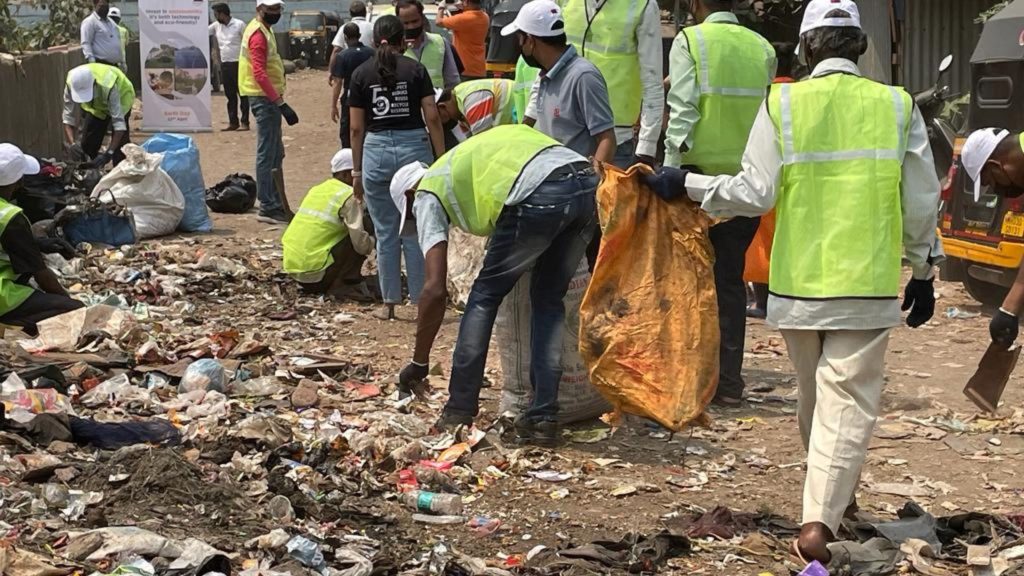
Earth5R’s Plastic-Free Campaign in Dehradun
Despite efforts to manage plastic waste, challenges persist, including lack of awareness and inadequate waste management infrastructure. However, by promoting recyclable and reusable alternatives and advocating for policy changes, Earth5R continues to address these challenges.
Plastic Free Initiatives: Integrated Efforts in Plastic Waste Mitigation
As Earth5R continues to expand its plastic-free initiatives, the organization remains dedicated to driving positive change and fostering environmental stewardship.
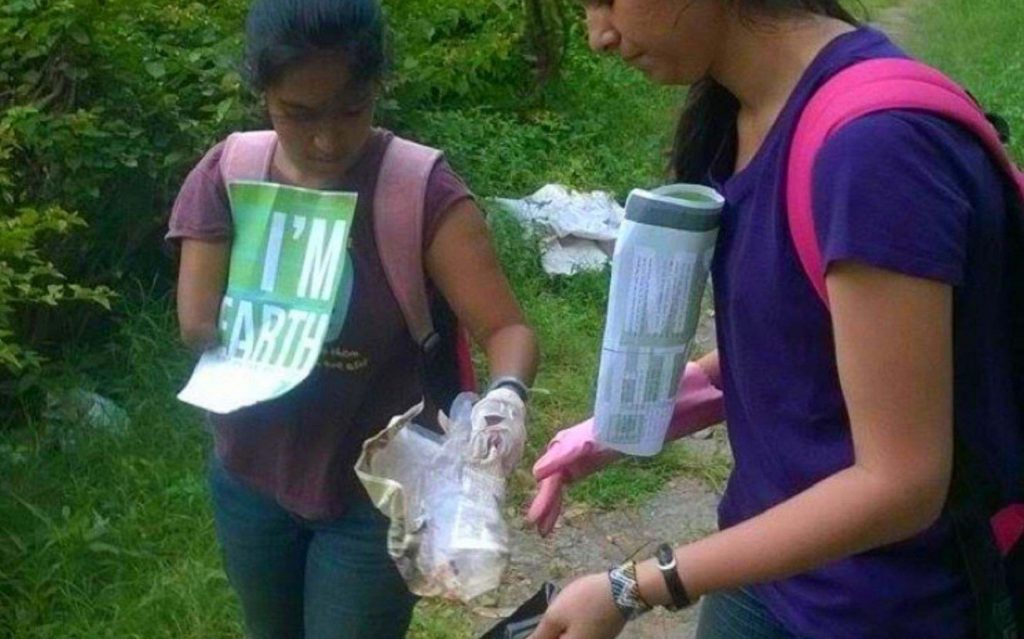
Earth5R’s Plastic-Free Campaign
By collaborating with stakeholders, advocating for policy reforms, and promoting the adoption of recyclable alternatives, Earth5R aims to create a more sustainable future for all.
CSR activities are instrumental in addressing plastic pollution and promoting environmental sustainability. Earth5R’s holistic approach to plastic waste management, coupled with innovative technology an Earth5R’s efforts in managing plastic waste and community engagement, exemplifies its commitment to creating a plastic-free future.
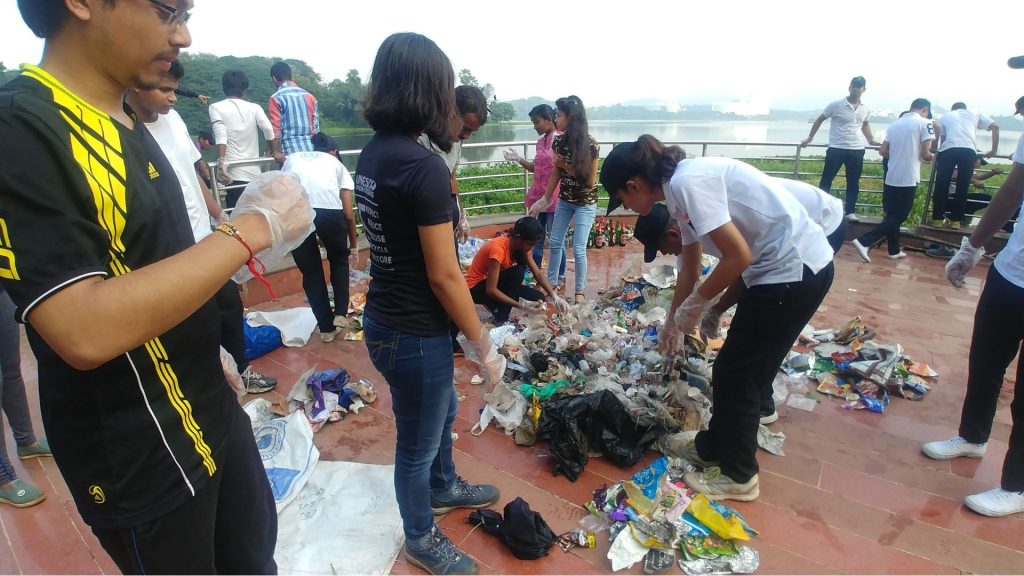
Earth5R’s plastic cleanup initiative at Powai Lake in Mumbai.

